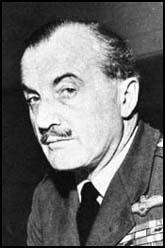John Slessor

John Slessor, the son of an army officer, was born in Ranikhet, India, on 3rd June 1897. Childhood polio left him lame in both legs and as a result he was initially rejected by the British Army as "totally unfit for any form of military service". However, with the help of influential members of his family, he was able to gain a commission in the Royal Flying Corps in 1914.
Slessor, a member of 17 Squadron, saw action in the Sudan during the First World War. He was badly wounded in 1916 but after making a full recovery he was appointed flight commander of 5 Squadron and was sent to the Western Front in France.
After a spell in business Slessor joined the Royal Air Force in 1920. He held several staff positions including commander of 4 Squadron (1925-28). His reputation was enhanced by the publication of his book, Air Power and Armies (1936). In the book Slessor argued that during a war heavy bombing could be used to destroy enemy morale.
In 1937 Slessor was appointed Director of Plans at the Air Ministry. During the Second World War he was Assistant Chief of the Air Staff (1942-43), Commander in Chief of Coastal Command (1943-44) and Commander in Chief of RAF Mediterranean and Middle East (1944-45).
After the war Slessor was Air Member for Personnel (1945-47), Marshal of the RAF (1950) and Chief of the Air Staff (1950-52).
Following his retirement from the Royal Air Force he was a Justice of the Peace, a county councillor and High Sheriff for Somerset. He also published two military books, The Central Blue (1956) and The Great Deterrent (1957). John Slessor died on 12th July, 1979.
Primary Sources
(1) John Slessor, The Central Blue (1956)
It is really a waste of breath discussing what Mr. Chamberlain should or should not have done at Munich itself. That surrender was the inevitable Nemesis that overcome us as a reward for the follies of the years before.
(2) John Slessor, The Central Blue (1956)
I believe he (Winston Churchill) always greatly overestimated the value of the French Army. That Army under Gamelin was useless in 1939, and I do not believe it would have been so much better in 1938 that it could have "rolled forward across the Rhine and into the Ruhr" even against the relatively weak German opposition at the time of Munich.
(3) John Slessor summarized the the views of Charles Portal on how Nazi Germany would be beaten (30th September, 1942)
"A" was to build up the resources necessary to get a decision by invasion before German industry and economic power had been broken;
"B" was to shatter German resistance by air and then put in the Army;
"C" was a compromise under which we tried to build up simultaneously strong land and air forces on a scale unrelated to any particular task, without any clear intention of attaining a definite object by a definite time.
For his part, he favoured course "B", for which he thought a combined heavy bomber force rising to a peak of between four and six thousand might be necessary.
(4) John Slessor, Coastal Command Review (June, 1943)
I wish to express to you and all under your command my admiration and warmest thanks for your achievements in the anti- U-Boat war during the month just ended. The brilliant success achieved in this field is the well deserved result of tireless perseverance and devotion to duty and is, I am sure, a welcome reward for the aircrews and others who have spared no effort during long months of arduous operations and training. Now that you have obtained this remarkable advantage over the U-Boats I know you will press it home with ever-increasing vigour and determination until, in conjunction with the Royal Navy, you have finally broken the enemy's morale.
(5) John Slessor believed it was wrong to bomb Monte Cassino in February 1944 and wrote to Charles Portal about it on 16th April, 1944.
Another lesson which I think has been, not learned perhaps, but confirmed in recent fighting in Italy is that the immediate battlefield is not the place to use the bomber, even the fighter-bomber. I have made many bad shots in the past, but one thing I have always said (and have in the past year or two often been twitted for having said) is that the bomber is not a battlefield weapon.
